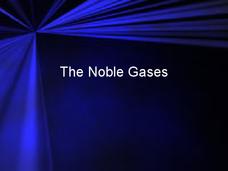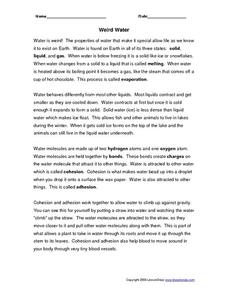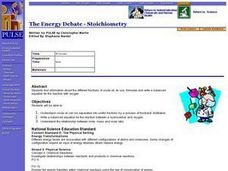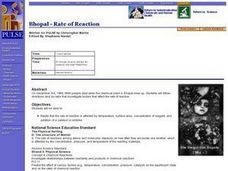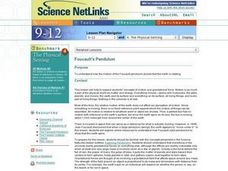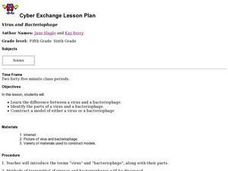Curated OER
The Noble Gases
When breaking down the details of the periodic table of elements, this presentation will explain special characteristics for each of the noble gases. The annotations are quite elementary, so this can easily be used in an introductory...
Curated OER
Ozone Tag
Young scholars explain the role of stratospheric ozone and predict at least three ways in which depleted ozone would change her/his lifestyle. They then
describe the process by which chlorine or bromine compounds can break down ozone...
Curated OER
Einstein's BIg Idea
High schoolers discuss what the m in E=mc2 represent. They relate that mass in a chemical reaction is always conserved. Students convey that atoms rearrange themselves in chemical reactions to form different molecules and compounds.
Curated OER
Atmospheric Pressure
Ninth graders explore the abstract idea of the atom and explain the differences and similarities between solids, liquids, and gases. They understand the molecular differences between solids, liquids, and gases.
Curated OER
How Do Scientists Research For Lab Activities?
Students explore the nature of scientific knowledge. They will also explore how to develop a lab plan to explain the structures of molecules and atoms. Research is essential to the success of the lab using necessary educational software.
Curated OER
Barnet Atmosphere Adv Word Search Puzzle
In this science and language arts learning exercise, students analyze 30 words in a word bank which pertain to the atmosphere and weather. Students find the words in a word search. The meaning of the title is unclear.
Curated OER
The Effects of Temperature on Chemical Mixtures
Students explore chemical cahnges and the effect of temperature on chemical mixturees, They make observations of the behavior and appearance of certain chemical mixtures and reactions.
Curated OER
What is a Chemical Reaction?-Evidence of Change
For this chemical reactions worksheet, students experiment with hydrochloric acid and copper (I) chloride to identify the types of reactions they undergo with various other substances. They also observe the law of conservation of mass...
Curated OER
Empirical Formulas
In this empirical formulas worksheet, students read about determining empirical formulas from chemical formulas. They determine the empirical formula given ten molecular formulas. They also find the molecular formulas given the mass and...
Curated OER
Acids and Bases
In this acids and bases learning exercise, students complete 32 fill in the blank and short answer questions on acidity or alkalinity. They color molecular diagram according to the key.
Curated OER
Weird Water
For this weird water worksheet, students read for information and assess comprehension. In this true and false, fill in the blank, and multiple choice worksheet, students answer ten questions.
Curated OER
The Energy Debate - Stoichiometry
Students determine crude oil can be separated into useful fractions by a process of fractional distillation. They write a balanced equation for the reaction between a hydrocarbon and oxygen.
Curated OER
Of Electron Bondage
Students create models of ionic and covalent electronic bonds to demonstrate their understanding of these chemistry concepts. They explain how both ionic bonds and covalent bonds work so that younger students can understand.
Curated OER
Polymers Lab: Bouncy Ball and Slime
Eighth graders investigate chemical reactions to produce polymers. In this polymers lesson plan, 8th graders experiment with sodium silicate and ethyl alcohol to make a polymer. They also experiment with borax and glue to make a polymer....
Curated OER
Bhopal - Rate of Reaction
Students determine that the rate of reaction is affected by temperature, surface area, concentration of reagent, and addition of a catalyst or inhibitor. They observe that on December 3rd, 1984, 8000 people died when the chemical plant...
Curated OER
When Things Start Heating Up
Young scholars explore how and why heat is produced from things that give off light, from machines, or when one thing is rubbed against another. They participate in several hands-on activities designed to help them realize that heat is...
Curated OER
The Energy Debate - Energy of Peanut
Students articulate the difference between the terms heat and temperature. They calculate the amount of energy associated with a given temperature rise and design an experiment to measure the energy of a fuel.
Curated OER
Physical and Chemical Properties of Matter
Learners identify the physical and chemical properties of matter. They review the types of matter. Students list the four states of matter (Solid, Liquid, Gas and Plasma). They recognize and describe the different types of matter.
Curated OER
Hot Cans and Cold Cans
Learners investigate the physics of heating and cooling through conduction, convection, and radiation. Working in groups, they determine the best way to cool a can of water and warm a can of water. Temperature is taken at five minute...
Curated OER
Foucault's Pendulum
Young scholars investigate how the motion of the Foucault pendulum proves that the Earth is rotating. They research the Internet about pendulums and conduct an experiment online. They view a multimedia presentation about pendulums and...
Curated OER
Virus and Bacteriophage
Students examine the differences between a virus and a bacteriophage. They explore various websites, identify the parts of a virus and a bacteriophage, and construct a model of a virus or bacteriophage.
Curated OER
Weight, Friction, and Equilibrium
For this weight worksheet, students read about weight, friction, and equilibrium. Students then complete 10 matching, 7 fill in the blank, and 8 word problems.
Curated OER
What is Matter?
In this matter worksheet, students answer 6 questions about matter. Students distinguish between homogeneous and heterogeneous mixtures, they identify elements and compounds and they distinguish between pure substances and mixtures.
Curated OER
Newton's Second Law
In this Newton's Second Law worksheet, students answer 13 questions about force, mass and acceleration. They calculate weight, force, masses and acceleration of objects.


